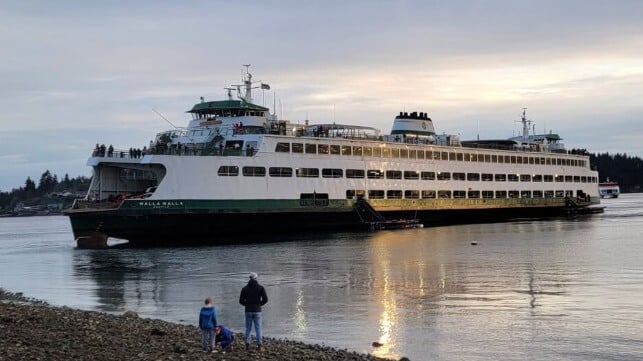Fungal Growth Plugged Fuel Filters on WSF Ferry, Causing Grounding

The recent grounding of the ferry Walla Walla near Bremerton, Washington was caused by "gross bacterial and fungal growth" in its fuel supply system, leading to severe fuel filter plugging and loss of power, according to operator Washington State Ferries.
Walla Walla lost power and ran aground near Lynwood Center, Bainbridge Island on the afternoon of April 15. At 1632 hours, the vessel was approaching Point Glover making about 18 knots. The captain was in the pilothouse, standing watch, and saw multiple alarms for the propulsion control system begin to go off. Alarms indicated that both ends of the double-ended ferry had lost power. In the engine room, the oilers and chief engineer struggled to bring power back online, but the engines would not maintain steady power.
At 1635, the captain ordered the crew to drop anchor, then sounded the general alarm and ordered passengers to brace for impact. One minute later, Walla Walla slid gently onto a soft mud bottom and came to a stop with an "almost imperceptible" transition from afloat to aground. She had sustained no damage except for scraped paint.
The crew did not yet know this, and the captain ordered preparations for abandoning ship. The Walla Walla had a staged evacuation plan; the first stage called for mustering passengers, distributing lifejackets, and deploying life rafts and slides. During this stage, communications among the crew were limited by a shortage of handheld radios, and passengers were not all willing to cooperate: some did not believe the casualty was serious and wanted to stay in their cars; others wanted to return to their cars when they learned that they would be aboard for an extended period; others attempted to challenge the crew's authority. The captain decided to call for a police presence to help keep order on the passenger deck, and this had the desired calming effect.
That evening, all passengers were evacuated to two other ferries operated by Kitsap Transit, and the last one was off the Walla Walla at 2210. A tug successfully towed the grounded ferry back to deep water at about 0030, and the stricken vessel was taken back to a pier in Bremerton for evaluation.
An inspection revealed that the Racor filters for the two ships' service generators were plugged with "black sludge." Samples tested positive for heavy bacterial or fungal growth. The source did not appear to be from the bunker supplier: The newly-bunkered fuel in the ferry's main tanks was clean and dry, lab tests revealed.
WSF found that the vessel's twin day tanks had both been contaminated with water as a result of human error. At some point in the past, the ferry's oilers had primed the centrifugal separator using fresh water, and this water had been discharged into the day tanks. The water in the tanks provided the medium for the microbial growth that plugged the engines. "Priming the separator with the very contaminant it is designed to extract from the diesel fuel . . . would have contributed to moisture in the day tanks," WSF concluded in its investigative report.

that matters most
Get the latest maritime news delivered to your inbox daily.
In their recommendations, WSF's investigators concluded that it would be best to improve operating procedures and technical supervision for priming the centrifugal separator.
Local media inferred that the vessel's advanced age was a contributing factor to the casualty, but loss of power from fuel contamination can occur on any vessel - even the newly-delivered Aiviq, an ultra-high-spec icebreaker which suffered filter and fuel-injection failures in the Gulf of Alaska in 2013.
